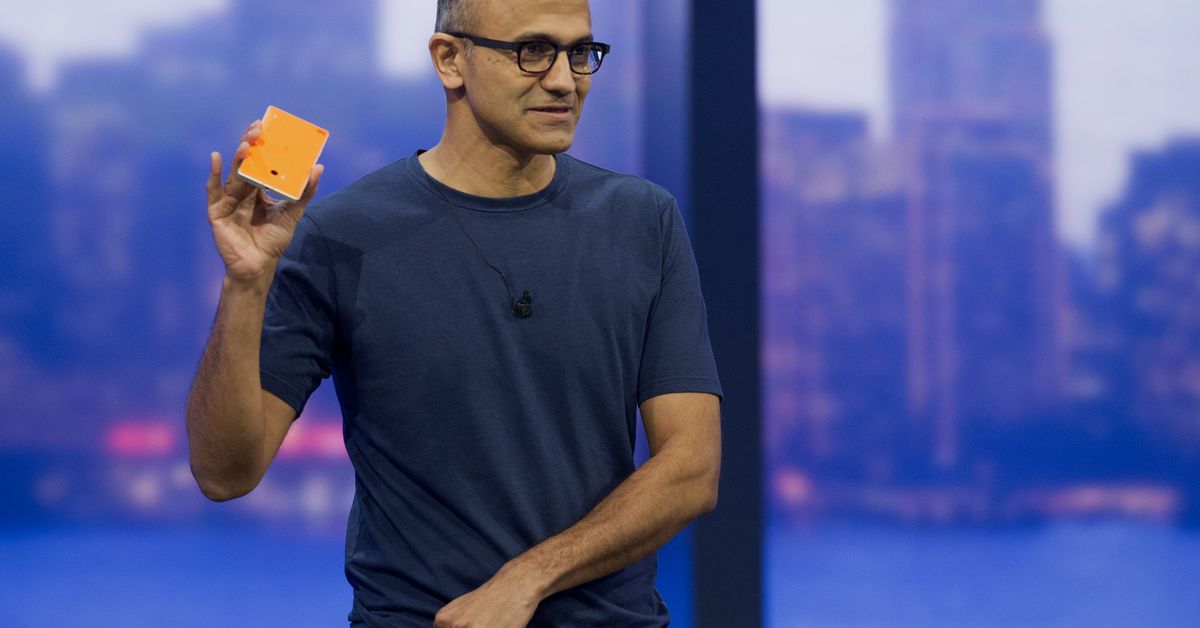- cross-posted to:
- technology@lemmy.world
- cross-posted to:
- technology@lemmy.world
Microsoft CEO Satya Nadella admits giving up on Windows Phone and mobile was a mistake::Satya Nadella wrote off Microsoft’s Nokia phone business acquisition and now says the company’s exit from mobile was a mistake.
I really wanted window 10 phones to take off. Their development into their now defunct projects such as Continuum and Munchkin in my opinion could have jump started and sustained smartphones as a legitimate productivity PC. Imagine having a cellphone you can dock anywhere and have a full blown windows OS to do things on…. That’s where they were heading.
Alas, the best we got is Dex and stage manager both being cellphone OS solutions for work PC tasks.
Imagine a Lumia with one of these new Snapdragon 8cx cores in it that slides into a lapdock. Plenty of power for like 90% of people
Just imagine all that extra data you could scrap for profit. $$$ all that spying and forcing ads into peoples faces … we all really missed out.
Cynical, but yeah, he probably had that in mind.
Microsoft minion when you stand up from your desk: noo, get back, geeet baaack
I’m stunned with how bad it was and why they hell they didn’t use the same strategy that made Windows popular… The apps.
My work back then gave me a Windows Phone. Very few of the apps I had on my Android phone was available for my work phone.
On top of that a lot of things simply didn’t work. One thing I still remember was that Alarm volume and Ring tone volume could not be adjusted individually.
The whole thing felt like they wanted to reinvent the wheel and started from absolute scratch without learning from the innovation in the past decade of mobile phones.
It’s sad, a third competitor in the smartphone space wouldn’t have been a bad thing.
The apps.
The industry just wasn’t interested. It’s too bad, the environment was excellent, and the phone was pretty slick. The HTC Sidekick will always be one of my favorite form factors for a phone.
There just wasn’t any interest in supporting a 3rd platform for most major companies.
I worked at a fortune 50 when the phone release and developed an app for it. The company looked at it and said they didn’t want to spend 50k to support it over the next year. The whole industry came to the same conclusion. Microsoft had to subsidize the 3rd party apps it got for the phone.
They did try to do that, but there wasn’t enough interest from companies to split their development teams to support a third platform. In fact Microsoft realised this and was so invested in it that they had a program where they would use MS devs to convert/build from scratch your iOS/Android app to run on Windows for free. All you had to do was take it over and maintain it after; almost no one took them up on it.
One of the clients I worked for had an interesting relationship with both Microsoft and BlackBerry at the time: both companies just outright paid them to build and maintain the Windows Phone and BlackBerry 10 apps, respectfully. Another agency did Windows Phone, but we billed them directly for the BlackBerry port of the Android app and its maintenance.
Lmao. Windows became popular because Apple was in shambles. Essentially they were the only game in town and literally because of that, overnight, they became THE operating system. Even with Jobs’ return and Apple’s meteoric rise, they were never able to even dent the monopoly they already built.
And they didn’t stop at personal computers. They innervated every business, post secondary institution, government sector and basically took over.
Microsoft is good at building and maintaining a monopoly. Outside of that, their actually products are third rate at best.
Microsoft should have embraced Android when it was clear that was winning out on the mobile front and shipped its own version of the OS.
Microsoft could have courted OEMs to use their flavour of Android instead by giving them a cut of appstore revenue and enticing developers over by offering sweeter revenue share deals as well. It’s all Android, a few shims for Google services and it’d be almost no effort for a developer to put their app on both storefronts and get more revenue as a result.
OEM’s don’t make money from the play store, only Google does. But no OEM has the clout and ability to draw developers over to run their own store - many have tried and they’re a barren wasteland of malware and out of date crapware. You can’t ship a device without an AppStore so Google wins and Phones get more expensive as a result.
In a world where the Play store has genuine competition and consumers can move from one device to another with the knowledge that all their favourite apps will still be available, we could have had a much better ecosystem.
It’s not too late, either, all Microsoft has to do is step up.
I really liked Surface Duo, atleast its design. Microsoft can actually innovate on that and not end up like LG but they decided to give up.
resurrect it !
Where Microsoft really dropped the ball is their devices didn’t run windows apps. The surface RT was a disaster, and the phone wasn’t what the average consumer thought of when they thought of Microsoft. It’s be a herculean miracle to get a W7 lite x86 phone to run for more than a couple hours, but if they’d taken that approach, it would’ve changed the game.
Or they could’ve build a reliable x86 emulator on ARM, but that also would have been an engineering miracle.
Yes.
This is the best summary I could come up with:
Microsoft CEO Satya Nadella is the third chief executive of the software giant to admit the company has made some serious mobile mistakes.
Satya Nadella took over from former CEO Steve Ballmer in 2014 and, just over a year later, wrote off $7.6 billion related to Microsoft’s acquisition of the Nokia phone business.
Asked about a strategic mistake or wrong decision that he might regret, Nadella responds:
Former Microsoft CEO Steve Ballmer was also slow to respond to Android and the iPhone threat, focusing the company’s efforts on Windows Mobile while famously laughing at the iPhone, calling it the “most expensive phone in the world and it doesn’t appeal to business customers because it doesn’t have a keyboard.”
“I regret there was a period in the early 2000s when we were so focused on what we had to do around Windows [Vista] that we weren’t able to redeploy talent to the new device called the phone,” explained Ballmer.
The company is constantly updating its Phone Link app to link Android and even iPhone handsets to Windows, and Microsoft has a close relationship with Samsung to ensure its mobile Office apps are preinstalled on Samsung’s Android handsets.
The original article contains 378 words, the summary contains 196 words. Saved 48%. I’m a bot and I’m open source!
Windows Phone was never going to work, but what I would have loved to see is
GoogleMicrosoft take on Android and dominate the market. Around that time, Microsoft were putting out some legitimately good hardware, and with some sane choices they could have been in a position now where they released a phone “powered by ChatGPT” and overpowered Google in a market they have been desperate to own for years.Did you mean “… see is Microsoft take on Android”? It doesn’t really make sense as it is now, Google already owns Android
Yep, that’s what I meant!










